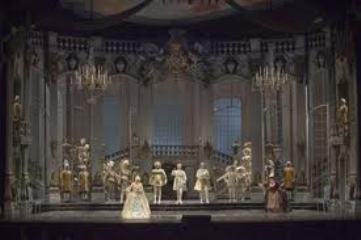Richard Strauss - Der Rosenkavalier (Met 1976)
Richard Strauss - Der Rosenkavalier (Met 1976)

1. Part 1 2. Part 2 3. Part 3 Octavian.....................Tatiana Troyanos Princess von Werdenberg......Teresa Zylis-Gara Baron Ochs...................Otto Edelmann Sophie.......................Judith Blegen Faninal......................William Dooley Annina.......................Shirley Love Valzacchi....................Andrea Velis Italian Singer...............Luciano Pavarotti Marianne.....................Marcia Baldwin Mahomet......................Kendall Quinn Princess' Major-domo.........Nico Castel Orphan.......................Linore Aronson Orphan.......................Nadyne Brewer Orphan.......................Elvira Green Milliner.....................Suzanne Der Derian Animal Vendor................Charles Kuestner Hairdresser..................Marc Verzatt Notary.......................Andrij Dobriansky Leopold......................Glenn Bater Lackey.......................Richard Firmin Lackey.......................Frank Coffey Lackey.......................Cecil Baker Lackey.......................Edward Ghazal Faninal's Major-domo.........Robert Schmorr Innkeeper....................Charles Anthony Police Commissioner..........Philip Booth
James Levine - conductor
Metropolitan Opera House.March 27, 1976 Matinee Broadcast
Some regard Der Rosenkavalier as Strauss' finest opera, and indeed, it has remained consistently popular since its premiere in 1911. Composed during 1909 and 1910 -- immediately after Elektra, Strauss' first collaboration with dramatist Hugo von Hofmannsthal -- Der Rosenkavalier is an original story, conceived jointly by Hofmannsthal and Strauss through extensive correspondence. It represents an intentional departure from Elektra (an adaptation of Sophocles' play) in both substance and tone, and the result is one of the most sophisticated libretti ever written -- full of subtle exchanges and turns of literary phrase. While the story was to have been a farce hinging upon the revelation of the character Mariandel as Octavian, Hofmannsthal developed the libretto into a more complex plot in which the primary narrative concerns the shifting relationship between the Marschallin and Octavian.
Hofmannsthal cast the drama in three acts, a more traditional scheme than Elektra's extended one-act plan, and perhaps a nod to the work's eighteenth century setting. Strauss also makes use of a conspicuously conservative musical idiom, eschewing the frankly dissonant and often abrasive textures he had used in both Elektra and Salome. At the same time, the orchestration of Der Rosenkavalier is both richer and marked throughout by delicate and shimmering sonorities. Strauss uses waltzes throughout the score to evoke a sentimental mood and to denote the middle-class sensibilities of Baron Ochs. Waltz themes are integral to each act, and the opera's orchestral waltz sequences, along with the more formal Rosenkavalier Suite (1945), remain popular as independent concert works. The opera's most impressive music occurs in the Act Three Trio between Oktavian, Sophie, and the Marschallin. Here, Strauss uses the three women's voices to convey the emotions of a young ingenue, her youthful suitor, and the mature Marschallin to great effect, the orchestra providing a telling underscoring. The static quality of the Trio creates an elegiac mood that at once combines the expression of youthful love with mature restraint.
Der Rosenkavalier, premiered in Dresden in January 1911, was received with great enthusiasm. The opera has remained a fixture of the stage, as evidenced by new productions in every decade since. Strauss attempted to recapture Der Rosenkavalier's popular appeal in his subsequent stage works; while some, like Arabella (1929-1932), are outstanding, they never eclipsed the successful alchemy of text and music that has ensured Der Rosenkavalier's permanence. --- James Zychowicz, Rovi
download: uploaded yandex 4shared mediafire solidfiles mega zalivalka filecloudio anonfiles oboom
Last Updated (Saturday, 17 May 2014 15:46)








